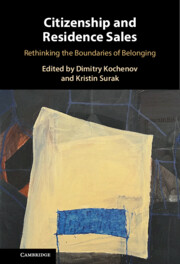‘Rigorous and sparklingly innovative interdisciplinary volume on emergent global commodification of citizenship status, offering a robust set of stringent empirical and historical analyses, framed by a resolutely non-romanticist conceptual approach to citizenship as status and practice, this collection lays indispensable groundwork for a new generation of ‘citizenship studies’. Essential reading for the field going forward.’
Linda Bosniak - Rutgers Law School
‘Passports by investment may be the ultimate political turn of globalization. Such programs recognize the demand for alternative citizenship or residence and supply these to the elite of the world. This deeply researched and well-written volume provides all the analytical tools and empirics for scholars and policymakers to study these arrangements and contemplate the longer term implications.’
Miguel A. Centeno - Princeton University
‘The prospect of ‘selling citizenship’ provokes indignation from those who cling to a romantic idea of what citizenship should mean, be or do. The authors of this volume proceed from the reality of what citizenship as legal status actually is and does, and raise important questions about the normative and pragmatic implications for regulating how citizenship is distributed.’
Audrey Macklin - University of Toronto
‘… this book is a valuable multidisciplinary resource on many different elements of these important products and the regulatory challenges they pose.’
Bruce Zagaris
Source: Tax Notes International
‘… an excellent collection of the arguments in favour of the CBI [Citizenship for Investment] programs.’
Peter Hilpold
Source: Europa Ethnica
‘The fact remains that by articulating law, economics and political science to subject residence and nationality to a close debate, the collective work edited by Kochenov and Surak presents an impressive series of arguments, likely to make the most seasoned specialists doubt. These arguments, in fact, feed a fundamental debate that is sometimes a little easily dismissed, by a few vague and irenic considerations on the importance and persistence of the nation. After Kochenov and Surak's book, such casualness is no longer an option. Perhaps more than convincing, then, the book destabilizes and gives us food for thought. Can one find a more pressing need for a book on the humanities?‘
Etienne Pataut
Source: Revue Critique de Droit International Privé



